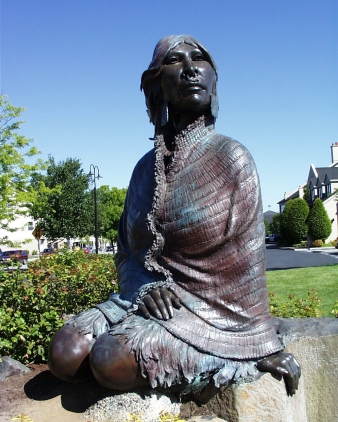On July 20, 1811, Duncan McDougal, Chief Factor for the Pacific Fur Company at Astoria, Oregon, and Ilchee, daughter of Chief Comcomly of the Chinook Tribe, married, becoming the first couple to be married in Astoria.
Washington Irving in his narrative Astoria (published in 1836) tells the tale:
“… M’Dougal, who appears to have been a man of a thousand projects, and of great, though somewhat irregular ambition, suddenly conceived the idea of seeking the hand of one of the native princesses, a daughter of the one-eyed potentate Com’comly, who held sway over the fishing tribe of the Chinooks, and had long supplied the factory with smelts and sturgeons. Some accounts give rather a romantic origin to this affair, tracing it to the stormy night when M’Dougal, in the course of an exploring expedition, was driven by stress of the weather to seek shelter in the royal abode of Com’comly. Then and there he was first struck with the charms of the piscatory (sic) princess, as she exerted herself to entertain her father’s guest.
The “Journal of Astoria,” however, which was kept under his own eye, records this union as a high state alliance, and great stroke of policy. The factory had to depend, in a great measure, on the Chinooks for provisions. They were at present friendly, but it was to be feared they would prove otherwise, should they discover the weakness and the exigencies of the post, and the intention to leave the country. This alliance, therefore, would infallibly rivet Com’comly to the interests of the Astorians, and with him the powerful tribe of the Chinooks. Be this as it may, and it is hard to fathom the real policy of governors and princes, M’Dougal dispatched two of the clerks as ambassadors extraordinary, to wait upon the one-eyed chieftain, and make overtures for the hand of his daughter.

The Chinooks, though not a very refined nation, have notions of matrimonial arrangements that would not disgrace the most refined sticklers for settlements and pin-money. The suitor repairs not to the bower of his mistress, but to her father’s lodge, and throws down a present at his feet. His wishes are then disclosed by some discreet friend employed by him for that purpose. If the suitor and his present find favor in the eyes of the father, he breaks the matter to his daughter, and inquires into the state of her inclinations. Should her answer be favorable, the suit is accepted and the lover has to make further presents to the father of horses, canoes, and other valuables, according to the beauty and merits of the bride; looking forward to a return in kind whenever they shall go to housekeeping.
We have more than once had occasion to speak of the shrewdness of Com’comly; but never was it exerted more adroitly than on this occasion. Com’comly was a great friend of M’Dougal, and pleased with the idea of having so distinguished a son-in-law; but so favorable an opportunity of benefiting his own fortune was not likely to occur a second time and he determined to make the most of it. Accordingly, the negotiation was protracted with true diplomatic skill. Conference after conference was held with the two ambassadors. Com’comly was extravagant in his terms; rating the charms of his daughter at the highest price, and indeed she is represented as having one of the flattest and most aristocratical (sic) heads in the tribe.
At length the preliminaries were all happily adjusted. On the 20th of July, early in the afternoon, a squadron of canoes crossed over from the village of the Chinooks, bearing the royal family of Com’comly, and all his court.
That worthy sachem landed in princely state, arrayed in a bright blue blanket and red breech clout, with an extra quantity of paint and feathers, attended by a train of half-naked warriors and nobles. A horse was in waiting to receive the princess, who was mounted behind one of the clerks, and thus conveyed, coy but compliant, to the fortress. Here she was received with devout, though decent joy, by her expecting bridegroom.
Her bridal adornments, it is true, at first caused some little dismay, having painted and anointed herself for the occasion according to the Chinook toilet; by dint, however, of copious ablutions, she was freed from all adventitious tint and fragrance, and entered into the nuptial state, the cleanest princess that had ever been known, of the somewhat unctuous tribe of the Chinooks.
From that time forward, Comcomly was a daily visitor at the fort, and was admitted into the most intimate councils of his son-in-law. He took an interest in everything that was going forward, but was particularly frequent in his visits to the blacksmith’s shop; tasking the labors of the artificer in iron for every state, insomuch that the necessary business of the factory was often postponed to attend to his requisitions. …”
Paul Kane wrote about Ilchee and Duncan McDougal in his Wanderings of an Artist among the Indians of North America, published in 1859:
“… [Ilchee] was the daughter of the great chief generally known as King Com’comly, so beautifully alluded to in Washington Irving’s “Astoria”. She was formerly the wife of a Mr. McDougall, who bought her from her father for, as it was supposed, the enormous price of ten articles of each description, guns, blankets, knives, hatchets, &c., then in Fort Astoria. Com’comly, however, acted with unexpected liberality on the occasion by carpeting her path from the canoe to the Fort with sea otter skins, at that time numerous and valuable, but now scarce, and presenting them as a dowry, in reality far exceeding in value the articles at which she had been estimated. On Mr. McDougall’s leaving the Indian country she became the wife of Casanov . . .” In 1813, when Astoria was turned over to the British, McDougal left. Ilchee eventually traveled up the Columbia to the Vancouver area and married Chief Casino (often seen as “Casanov”), a Chinook chief and successor to Chief Com’comly, before returning to her home at the mouth of the Columbia.
~~~
In 1823, in the ‘custom of the country,’ Archibald McDonald took a Native wife, Princess Raven – Koale’Koa – daughter of the influential Chinook chief Com’comly. Early in 1824 a son, Ranald, was born to them. Raven did not long survive the baby’s arrival, and Ranald was sent to live with his mother’s sister, Ilchee, in Com’comly’s lodge.







